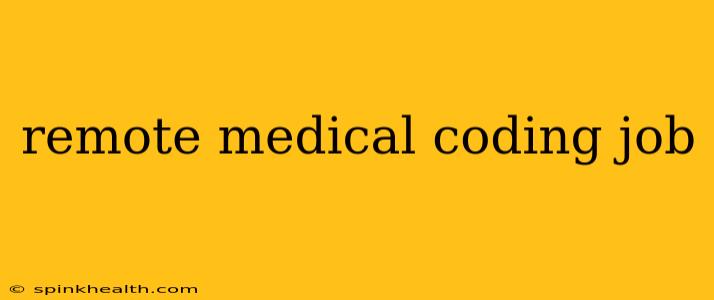The world of healthcare is constantly evolving, and with it, the demand for skilled medical coders continues to grow. But what if you could enjoy the flexibility of working from home while contributing to the vital task of accurate medical billing? That's the beauty of remote medical coding jobs. This isn't just a trend; it's a revolution in how healthcare professionals work. Let's delve into the exciting world of remote medical coding, exploring everything you need to know to embark on this rewarding career path.
What is Medical Coding?
Imagine a vast, complex medical system where every procedure, diagnosis, and service needs a specific numerical code. That's the realm of medical coding. Medical coders translate medical diagnoses, procedures, and services into standardized codes using systems like ICD-10 (International Classification of Diseases, 10th Revision) and CPT (Current Procedural Terminology). These codes are then used for billing insurance companies, ensuring accurate reimbursement for healthcare providers. It's a crucial role in the smooth functioning of the healthcare industry, a detail-oriented job requiring accuracy and a strong understanding of medical terminology.
Why Choose a Remote Medical Coding Job?
The allure of remote medical coding jobs is undeniable. Imagine: working in your pajamas, setting your own schedule (within reasonable deadlines, of course), and enjoying the freedom of a home office. But the benefits go beyond the comfort of your home. Here are some key advantages:
- Flexibility: Design a work schedule that suits your lifestyle, offering a better work-life balance.
- Location Independence: Work from anywhere with a reliable internet connection. Live in a rural area? No problem!
- Reduced Commuting Costs and Time: Say goodbye to stressful commutes and hello to extra hours in your day.
- Increased Job Opportunities: The remote work revolution has opened up a vast pool of opportunities nationwide, even globally.
What Skills Do I Need for a Remote Medical Coding Job?
Becoming a successful remote medical coder requires a blend of technical skills and soft skills. Here's a breakdown:
- Medical Terminology and Anatomy: A solid understanding of medical terms and anatomical structures is crucial for accurate coding.
- ICD-10 and CPT Coding: Proficiency in using these coding systems is paramount.
- Medical Billing and Insurance Procedures: Familiarity with billing processes and insurance regulations is essential.
- Data Entry Skills: Accurate and efficient data entry is key to minimizing errors.
- Attention to Detail: Medical coding demands meticulous accuracy; even a small mistake can have significant repercussions.
- Strong Computer Skills: Proficiency in using various software programs is necessary.
- Excellent Communication Skills: Whether interacting with clients, supervisors, or colleagues, clear and effective communication is vital.
How Can I Find Remote Medical Coding Jobs?
Finding your dream remote medical coding job takes research and effort, but the rewards are worth it. Here are some effective strategies:
- Online Job Boards: Explore major job boards like Indeed, LinkedIn, and Monster, filtering for "remote medical coder" or similar terms.
- Company Websites: Directly check the careers pages of healthcare organizations, medical billing companies, and insurance providers.
- Networking: Connect with medical professionals and recruiters through online groups and professional organizations.
- Freelancing Platforms: Platforms like Upwork and Fiverr offer opportunities for freelance medical coding work.
What are the Salary Expectations for Remote Medical Coders?
The salary for remote medical coding jobs varies based on experience, location, and employer. Entry-level positions may offer lower salaries, while experienced coders with certifications command higher rates. Researching salaries in your specific area and experience level will give you a realistic expectation.
What Certifications are Available for Medical Coders?
Several certifications can enhance your qualifications and increase your earning potential. Researching and pursuing relevant certifications, such as those offered by the American Academy of Professional Coders (AAPC) or the American Health Information Management Association (AHIMA), demonstrates your commitment to professional excellence.
How Can I Improve My Chances of Getting a Remote Medical Coding Job?
To stand out from the competition, consider these tips:
- Obtain Relevant Certifications: Boost your credibility and marketability with certifications.
- Build Your Resume and Portfolio: Showcase your skills and experience effectively.
- Network with Professionals: Connect with individuals in the field to learn about job opportunities and gain valuable insights.
- Highlight Your Remote Work Skills: Emphasize your ability to work independently, manage your time effectively, and communicate efficiently remotely.
Embarking on a career as a remote medical coder offers a unique blend of professional fulfillment and personal flexibility. With dedication, the right skills, and a proactive approach, you can successfully navigate this exciting path and create a thriving career from the comfort of your own home.

